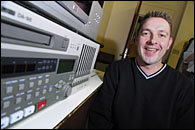King of sound
On November 28, a McGill graduate returned to the Strathcona Music Building, bearing words of wisdom, three Grammy awards, and a Surround Sound recording of a jazz-noir album rooted in Hollywood's seamy underworld.
 Sound engineer Richard King
Sound engineer Richard KingPHOTO: Owen Egan |
|
The occasion of Richard King's visit to his alma mater was a special presentation of the Audio Engineering Society of McGill University, in which he and Kimio Hamasaki (of the NHK Science & Technical Research Laboratories in Tokyo), spoke about their recording careers.
Richard King graduated with an master's in Music Sound Recording in 1991, then he began working for Sony Classics in New York City. "The programme at McGill covers both training for pop and classical," says the senior recording engineer, who grew up playing percussion in youth orchestras and guitar in punk bands.
"At the time I graduated," he continues, "Sony Classical had its head offices in Europe, so they were looking for a European-style engineer -- what the Germans call a tonmeister, someone who can read music and follow the score but also knows the technical side," which is the style McGill emulates.
King now travels the world, recording orchestras, large jazz ensembles and film scores in the world's top studios and concert halls. (Not surprisingly, he is "very excited" about the proposed Centre for Interdisciplinary Research in Music Media & Technology facilities in McGill's new Music Building, which he thinks could rival London's famed Abbey Road and AIR Lyndhurst studios.) He's won Grammys for his work on Joshua Bell's West Side Story Suite, Appalachian Journey (a collaboration between Yo-Yo Ma, Edgar Meyer, and Mark O'Connor), and the soundtrack for Crouching Tiger, Hidden Dragon.
King typically works with 80 to 100 players per session, and thrives on the rush of such a large-scale production.
"The best part of my job is the thrill of orchestral recording," he said. "Although I really like pop music, I don't regret that I'm not working in that field all the time. I think it might get boring listening to the same three-minute pop song over and over. But having a hundred people on stage when the clock is running so there's no time to sit around -- you're on the edge of your chair and it's very exciting."
King's lecture, "Stereo and Surround Microphone Techniques for Acoustic Music Recording," addressed two hot topics in the recording world: Super Audio Compact Discs (SACDs) and Surround Sound. SACDs use Direct Stream Digital (DSD) recording technology which, in layperson's terms, makes the discs sound a whole lot better than traditional CDs. SACDs can hold much more information, including complicated stuff like Surround Sound, those fancy recordings which use five strategically placed speakers to fill a room with complex layers of sound.
The catch, however, is that the music industry is slow to embrace Surround Sound recording, partly due to economics. An orchestral recording session with only one producer can cost $5 per second, so it's folly to expect a record company to pony up funds for one producer to create a traditional stereo recording, and another to work in Surround Sound.
King spoke about the challenges of simultaneously engineering two recordings during the same session and ways to create a Surround Sound recording out of a traditional stereo session. Through clever microphone and musician positioning, an engineeer can build the future of sound on the cheap (then hope that someone will have to foresight to release both to the public). He played a pre-release copy of the Surround recording of Bob Belden's Black Dahlia, a moody jazz album inspired by an unsolved murder in 1947 Los Angeles. The stereo version of the album came out to much acclaim last year; its Surround equivalent is only now seeing a commercial release.
After his lecture, King made a shocking confession. When he's away from the studio, the man who is celebrated for his work with the likes of Andre Previn and Isaac Stern listens to music "not so much in the classical vein."
"I listen to a lot of harder stuff," he admits, "like Fuel, Incubus, Linkin Park. It's an interest that goes back to my youth."
Are King's highly trained engineer's ears hearing something special in these recordings? Does this mean an album like Incubus's Fungus Amongus is a tragically overlooked audiophile's delight which won't get its proper due for years to come?
"Not really," he says. "I hear what they're doing, but I just like loud music."

